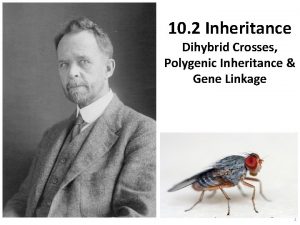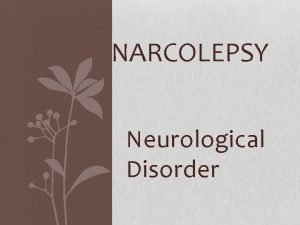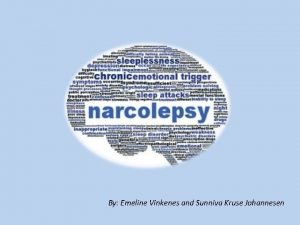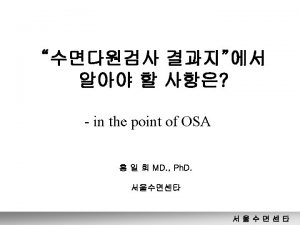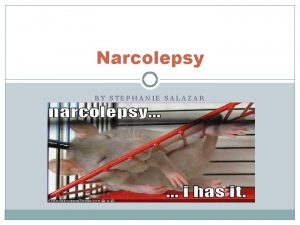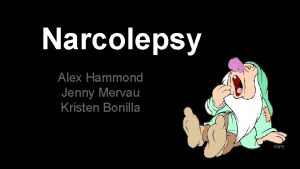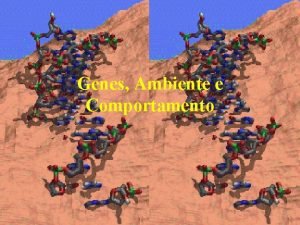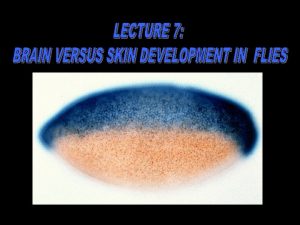Narcolepsy Theory Fairly new theory links narcolepsy genes













- Slides: 13

Narcolepsy

Theory • Fairly new theory links narcolepsy, genes and hypocretin (a neurotransmitter) • Hypocretin regulates arousal, wakefulness and apetite • Genetic variations on chromosome 6 (aka HLA complex) predisposes an individual to narcolepsy • Increase risk of auto-immune response to neurons that produce hypocretin • People with narcolepsy have greatly reduced numbers of hypocretin-producing neurons • However, some auto-immune responses can be caused by a flu vaccination rather than genes

IDA

Biological Reductionism • Suggests that Narcolepsy is biologically caused by the neurotransmitter hypocretin alone. • Seen as a positive because it allows narcolepsy to be measured in a scientific way. • Reducing the disorder to a single cause – the neurotransmitter hypocretin. • Allows scientists to manipulate hypocretin levels and objectively measure it’s effects on an individual predisposed to narcolepsy. • Allowed scientists to link the auto-immune response to hypocretin synthesising neurones to narcolepsy.

Research Evidence 1: • Siegel et al ( 2000) managed to acquire the preserved brains of 4 narcoleptics and after a close examination they were found to have 93% fewer hypocretin neurons than a nonnarcoleptic’s brain. • This shows that there is a link between reduced levels of hypocretin and narcolepsy

Evaluating the study Positive: • Scientific and controlled as its a lab study. • High percentage - strong link between fewer hypocretin and narcolepsy. Negative: • Small sample - it can’t be generalized to others. • Correlational data - can’t establish cause and effect between number of hypocretin neurons and narcolepsy.

Research Evidence 2: • Mignot et al (1999) found that narcoleptic dog had a defective hypocretin receptor 2 gene, the hypocretin receptor 2 gene is found in both humans and dogs. This supports the idea that the hypocretin receptor is responsible for narcolepsy, as it is the same across species.

Evaluating the study Negative: • Correlational - therefore can’t establish cause and effect between the defective gene and narcolepsy. • Carried out on animals – ethical issues and hard to generalize, could effect humans differently compared to animals. • Doesn’t take into account environmental factors.

Research Evidence 3: • Broughton (1999), reported that lifestyle adjustments, such as regulated sleep schedules and relaxing before bed, were more successful at treated the symptoms of narcolepsy than drugs. • This shows that. . ?

Evaluating the study Negative: • Only treating the symptoms of narcolepsy and not the route cause. • Uses self-report methods, which means it doesn’t have high internal validity. Positive: Provides practical applications for those suffering with narcolepsy.

Research Evidence 4: • Research has shown that there is a 20 – 40 times increase of narcolepsy in first degree relatives. • This suggests that genetics play an important role in narcolepsy.

Evaluating the study Positive: Could have practical applications, for example, helping narcolepsy sufferers to decide whether or not to have children. Negative:

Wider Evaluation • Research conducted by Mignot et al. is on dogs, not humans. • Results cannot be extrapolated or generalised to humans. • Anatomy and physiology of animals differ from humans. • Also humans can think about experiences in a way which animals cannot, this may mediate and therefore change sleep patterns. • So in terms of narcolepsy, what is true for animals may not be true for us. • Research by Broughton could have useful applications for individuals predisposed to narcolepsy e. g. making lifestyle adjustments, relax before bed, not engaging in alerting activities before bed e. g. listening to heavy music.
 Linked genes and unlinked genes
Linked genes and unlinked genes What are homeotic genes
What are homeotic genes Linked genes and unlinked genes
Linked genes and unlinked genes Narcolepsy
Narcolepsy Narcolepsy
Narcolepsy Rera psg
Rera psg New york links
New york links Fairly satisfactory grade
Fairly satisfactory grade How can governments ensure citizens are treated fairly
How can governments ensure citizens are treated fairly Fairly tales
Fairly tales The fairly intelligent fly
The fairly intelligent fly An inspector calls quiz
An inspector calls quiz Treating customers fairly training
Treating customers fairly training It's fairly easy
It's fairly easy


